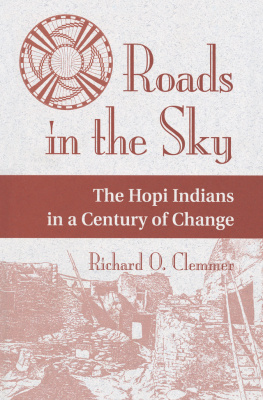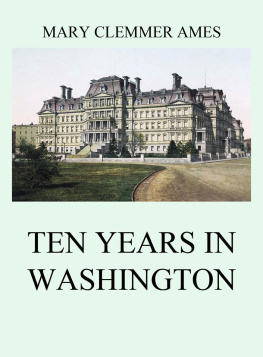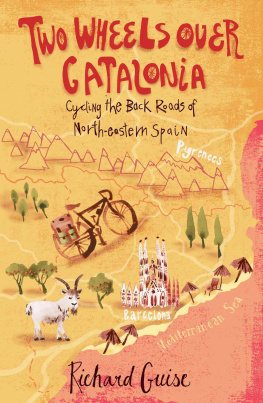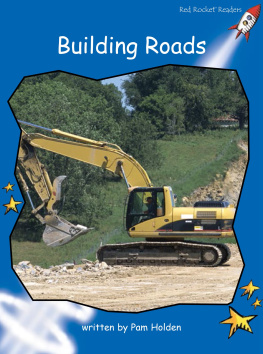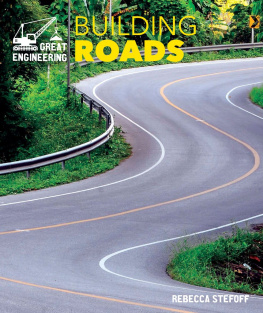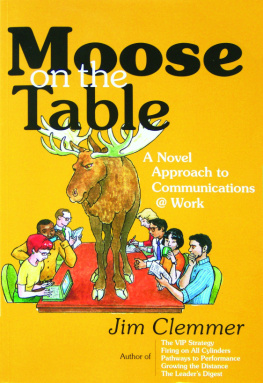Roads in the Sky
Conflict and Social Change Series
Series Editors
Scott Whiteford arid William Derman
Michigan State University
Roads in the Sky: The Hopi Indians in a Century of Change, Richard O. Clemmer
Ancestral Rain Forests and the Mountain of Gold: Indigenous Peoples and Mining in New Guinea, David Hyndman
"I Am Destroying the Land!" The Political Ecology of Poverty and Emmonmental Destruction in Honduras, Susan C. Stonich
More Than a Living: Fishing and the Social Order on a Polynesian Atoll, Michael D. Lieber
The Culture of Protest: Religious Activism and the U.S. Sanctuary Movement, Susan Bibler Coutin
Computing Myths, Class Realities: An Ethnography of Technology and Working People in Sheffield, England, David Hakken with Barbara Andrews
Literacy, Power, and Democracy in Mozambique: The Governance of Learning from Colonization to the Present, Judith Marshall
Gender, Sickness, and Healing in Rural Egypt: Ethnography in Historical Context, Soheir A. Morsy
Life Is a Little Better: Redistribution as a Development Strategy in Nadur Village, Kerala, Richard W. Franke
igame! igame! Struggle and Social Change in a Nicaraguan Urban Community, Michael James Higgins and Tanya Leigh Coen
Manufacturing Against the Odds: Small-Scale Producers in an Andean City, Hans C. Buechler and Judith-Maria Buechler
The Bushman Myth; The Making of a Namibiern Underclass, Robert J. Gordon
Surviving Drought and Development: Ariani Pastoralists of Northern Kenya, Elliot Fratkin
Roads in the Sky
The Hopi Indians in a Century of Change
Richard O. Clemmer
Conflict and Social Change Series
First published 1995 by Westview Press
Published 2018 by Routledge
711 Third Avenue, New York, NY 10017, USA
2 Park Square, Milton Park, Abingdon, Oxon OX14 4RN
Routledge is an imprint of the Taylor & Francis Group, an informa business
Copyright 1995 Taylor & Francis
All rights reserved. No part of this book may be reprinted or reproduced or utilised in any form or by any electronic, mechanical, or other means, now known or hereafter invented, including photocopying and recording, or in any information storage or retrieval system, without permission in writing from the publishers.
Notice:
Product or corporate names may be trademarks or registered trademarks, and are used only for identification and explanation without intent to infringe.
A CIP catalog record of this book is available from the Library of Congress.
ISBN 13: 978-0-8133-2511-8 (pbk)
ISBN 13: 978-0-8133-8538-9 (hbk)
Photo section faces p. 124
Tables
Figures
Maps
I first went to the Hopi Mesas in the summer of 1968 to gather oral histories for a project funded by Doris Duke and sponsored by the University of Illinois Department of Anthropology, where I was a fledgling graduate student. I returned the following summer for the same purpose. Although little of that early research is reflected in the following pages, they do reflect much of the work that I did in the subsequent two years for a Ph.D. dissertation dealing substantially with cultural change.
Although I was able to spend little time on the Mesas after 1973, the Sekaquaptewa family's excellent weekly newspaper, Qua' Toqti, in the 1970s and 1980s kept me abreast of developments. My relocation to Santa Fe, New Mexico, in 1979 and subsequently to Colorado, as well as service on the American Anthropological Association's Navajo-Hopi Land Dispute Committee since 1990, made more frequent visits of longer duration possible.
Over the last quarter-century much has changed. Some changes were predictable; others were not. Issues such as the land dispute, generated in outline nearly three centuries ago and etched in concrete, so to speak, by a series of U.S. Government actions and inactions beginning in 1882, might well have festered indefinitely with little expectation of even minimal resolution. On the other hand, Peabody Coal Company's stripmining of coal and deep-mining of artesian water became an issue for Hopis in 1969 and continues to be worrisome. While the rest of North America experienced an acceleration of social problems such as family conflicts, ideological factionalism, and substance abuse, it would have been folly to assume that Hopis would not experience these problems as well, and they soon did. While telephones were virtually non-existent in 1968 and piped water and electricity were seldom encountered, it was predictable that telephones, televisions, VCRs, and computers would become commonplace, as they now are.
But the waning of Christianity; the strengthening of the importance of oral tradition and ceremonialism; the persistence of matrilineality and clan ownership of lands at First and Second Mesas (re-affirmed in a court case in Hopi Tribal Court as late as 1983); the preservation of Walpi as a Tribal historic site; and the development of proprietary interests on the part of Hopis in cultural property religious and non-religious prior to passage of the Native American Graves and Repatriation Act might riot have been predicted a quarter-century ago. In fact, I recall an official of the Bureau of Indian Affairs in Keams Canyon telling me quite conclusively in that first summer of 1968 that one day, the Hopi Reservation would cease to exist. It would be divided up into individually owned plots; the villages would become little cities or would cease to exist politically; the Tribe would be legally abolished; and Hopis would become just ordinary U.S. citizens, just as would all Indians, differing from other citizens only in their difference of heritage and perhaps customs.
No Hopis I talked to believed for an instant that such a situation would come to pass. Hopis would resist "termination" to the bitter end. And within two years U.S. Indian policy had indeed changed and the termination idea was shelved. But the overall issue of assimilation, acculturation, and cultural homogenization increasingly a worldwide phenomenon brought about by easy access to communication and internationally circulated durable goods remained trenchant and prominent. Would Hopis, and other Indians, simply become politically, economically, and ethnically enclaved as a rural proletariat, with little control over their destinies? Such predictions were, indeed, made.
Yet early on in my Hopi experiences I had encountered the "Traditionalists," a political group that continues to be poorly understood even by those who are familiar with the Hopi. It seemed to me that the vehemence of reaction to them portended something a little more complex than merely political factionalism over acculturation. The "Traditionalists" advocated a platform of sovereignty, self-determination, and international recognition that has now come to be recognized as common to many indigenous peoples throughout the world. They are not, strictly speaking, either nativists or cultural conservatives. In fact, they belong much more to the modernist traditions of critique and dissent than they do to the anti-modernization forces of conservatism, other-worldly exclusionism, or back-to-the-land agrarian communalism, despite displaying some aspects of these social movements.
Hopi Traditionalism has become incorporated into Hopi politics and society to the extent that Traditionalism can be said to be undergoing institutionalization. When I realized that this institutionalization was happening, much of the confusing rhetoric that surrounds the Traditionalists became clear in terms of its impetus: no modernization ever takes place without some kind of ideologically constructed struggle, and Hopi Traditionalism is merely part of Hopis' version of that struggle.


